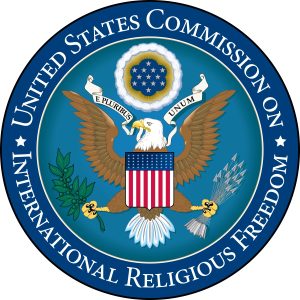The U.S. Commission on International Religious Freedom has released its annual global report with an emphasis on blasphemy laws that the Freedom From Religion Foundation wants to amplify.
The quasi-official commission’s 96-page report mentions blasphemy almost once per page and includes a separate compendium on the topic. As it points out, blasphemy laws are inconsistent with Articles 18 and 19 of the Universal Declaration of Human Rights and the International Covenant on Civil and Political Rights — foundational documents protecting religious freedom and freedom of expression. The commission also emphasizes that “blasphemy laws promote official discrimination and intolerance against minorities and minority viewpoints and encourage individuals and nonstate groups to seek retribution against alleged blasphemers.”
The blasphemy compendium identifies 95 countries that have blasphemy laws, with penalties ranging from fines to capital punishment. FFRF echoes the commission’s call for “the President, U.S. Department of State, and Congress to urge countries around the world to repeal all legislation criminalizing blasphemy.” However, conspicuously absent from the list is the United States, where at least eight states still have blasphemy laws on the books, even if they are currently unenforceable. Still, until these domestic laws are officially repealed, it is hard to expect other countries to take the United States seriously. And until a repeal, there remains domestically the issue that the Commission on International Religious Freedom has identified abroad: Nonstate actors in the United States may see the blasphemy laws as permission to seek retribution against alleged blasphemers.
The United States is worryingly also absent from the report’s overall global discussion. While we grapple with an extremist Supreme Court that tramples precedent in order to privilege favored Christian plaintiffs, and federal officials who openly celebrate anti-American Christian nationalism, the United States at least qualifies for the commission’s “Special Watch List,” which it says includes “countries where the government engages in or tolerates ‘severe’ violations of religious freedom.” The U.S. Commission on International Religious Freedom report is presented as a recommendation to the State Department, meaning it concerns foreign countries, but without any self-reflection the report gives the incorrect impression that the religious freedom violations described are nonexistent domestically.
When it comes to Hindu nationalism, the commission confidently and correctly labels India as a Country of Particular Concern, the most severe designation. The Biden administration has declined to adopt this designation even though, as the report points out, in 2023 “religious freedom conditions in India continued to deteriorate” as the government “reinforced discriminatory nationalist policies, perpetuated hateful rhetoric, and failed to address communal violence disproportionately affecting Muslims, Christians, Sikhs, Dalits, Jews and Adivasis (indigenous peoples).” India’s Hindu nationalist catastrophe is a cautionary tale of what could happen in the United States if reckless Christian nationalist politicians are not held accountable for their rhetoric.
Another country the Biden administration has yet to designate as a Country of Particular Concern, despite the commission’s recommendation to do so, is Nigeria, where religious freedom conditions “remained extremely poor” in 2023. Specifically, in 2023 “the government detained individuals accused of blasphemy and often failed to hold accountable perpetrators of violence related to blasphemy allegations.” Among others, humanist Mubarak Bala is still incarcerated for a victimless alleged act of blasphemy.
Other countries that the commission recommends be added as Countries of Particular Concern are Afghanistan, Azerbaijan and Vietnam.
“FFRF thanks the U.S. Commission on International Religious Freedom for its thorough annual report,” comments FFRF Co-President Annie Laurie Gaylor. “The State Department should follow these recommendations and move forward with the difficult task of informing the general public about these crucial threats to religious liberty — both domestic and abroad.”
The Freedom From Religion Foundation is a national nonprofit organization with 40,000 members and several chapters all over the country. Our purposes are to protect the constitutional principle of separation between state and church and to educate the public on matters relating to nontheism.


